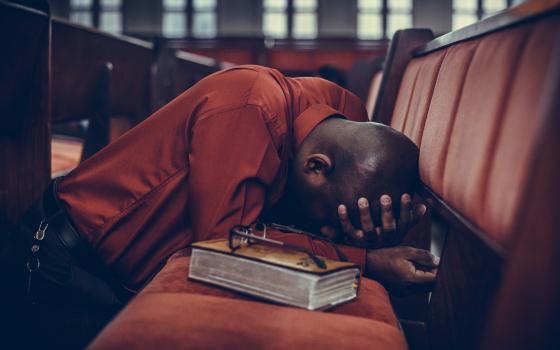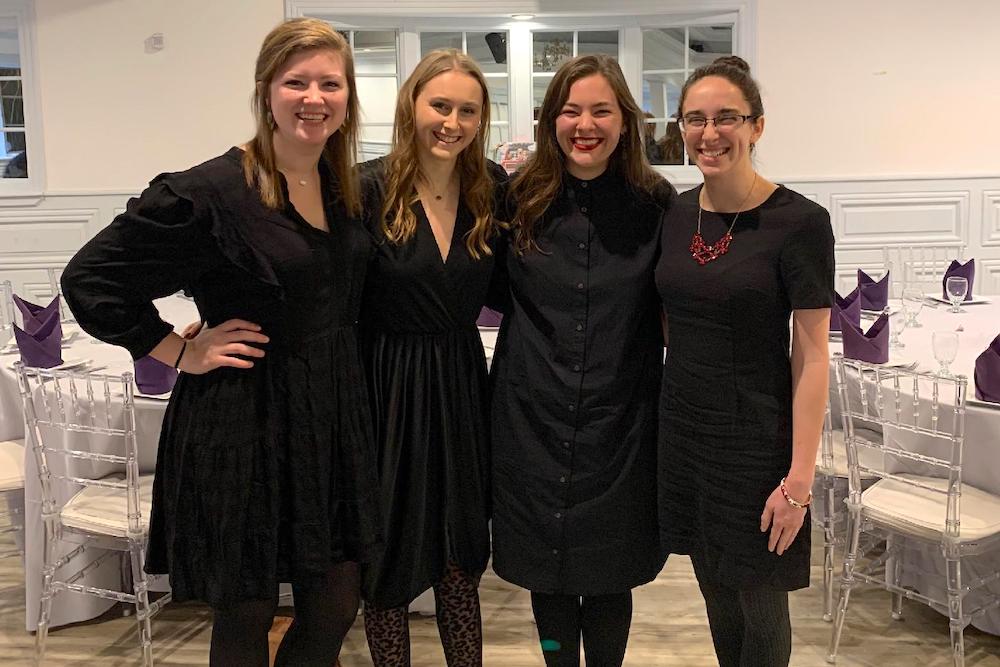
Shannon, Ellie, Jenny and Maria were roommates in New York during their Notre Dame AmeriCorps service before the coronavirus self-isolation rules meant they had to go home. (Provided photo)
Editor's note: Notes from the Field includes reports from young people volunteering in ministries of Catholic sisters. A partnership with Catholic Volunteer Network, the project began in the summer of 2015. This is our 11th round of bloggers: Celine Reinoso is a Loretto Volunteer in El Paso, Texas, and Maria Longo is a Notre Dame AmeriCorps volunteer in the Bronx, New York.
Vulnerability is a difficult and tricky thing. On the one hand, we are called to keep watch over the garden of our hearts and guard it well. At the same time, however, we are called to share the truth that the Lord has spoken into the world through us.
Before we were forced into social isolation, this was a huge topic of discussion for our community at dinner one night. The one thing I have clung to from New York City — aside from the love and service of my students — is my community; namely, my roommates. I was assigned to an apartment with three roommates at the start of the school year: Ellie, Jenny and Shannon. We are vastly different creatures; this often sparks rich and deeply reflective debates.
We began the evening by recognizing that there could be inappropriate times and ways to be vulnerable. We then posed a question: Did that make all vulnerability bad?
Advertisement
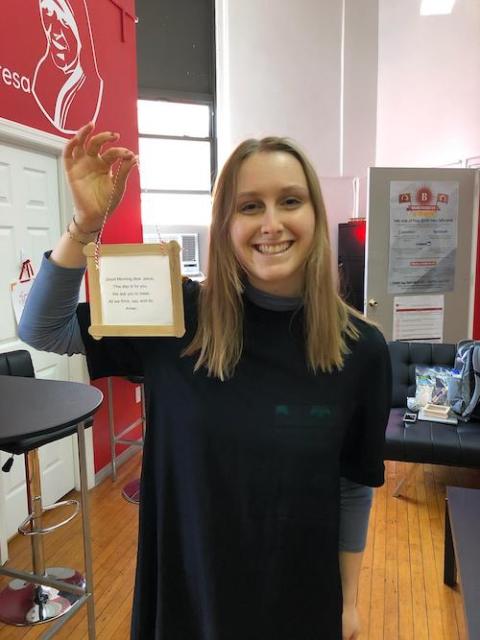
Ellie displays her kindergarten craft. (Maria Longo)
Jenny pointed out that she simply doesn't like to share of self, that every time she does, she feels a piece of her goes away with the person or people to whom she has made herself vulnerable. In response, Ellie shared that this seemed to put a limitation on how much she could know and love Jenny.
Now, I do not believe there is a limit to how much we can love a person because true love comes from God himself, of whom there is no limit. For instance, if there is a vessel — a cup, let's say — that is being poured into constantly, so long as the glass is not obstructed and the stream — of water or grace — does not stop, it may be filled and will constantly overflow.
The volume of the cup does not matter; what matters is that the cup is full and overflowing. We know that the Lord will never stop loving us, nor will he ever stop pouring graces upon us, so unless there is something obstructing our hearts, an ever-flowing torrent of Truth will come flooding through us and out into those we encounter.
Then came other questions. What is vulnerability? What type of thing is it?
We wondered then if vulnerability is divisive or multiplicative. For instance, joy is multiplied, and suffering is divided. The joy I can give one person does not detract from the joy I have myself. In contrast, the suffering one person could share with me does not give me a duplicate burden, but rather shares the load between us, much like how the load of a cart can be shared by two oxen under one yoke.
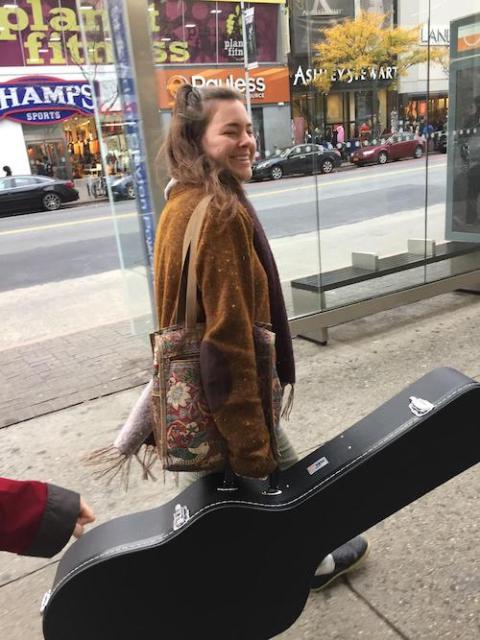
Jenny on her way to serve (Maria Longo)
Jenny then posited that in sharing of self, we also make others vulnerable, as well, since no man is an island. In making ourselves vulnerable, do we not sometimes share information about other people that they might find to be personal and private? This, we determined, was true, and we came to a consensus that prudence should always be used in determining what we say and how we say it.
However, we also thought back to many biblical stories, especially the stories of the Gospel. I realized that if the stories of those people had not been shared, by themselves or by others, I certainly wouldn't be the person I am today. I would not know the Lord the way I do, simple and insignificant as my knowledge and understanding of him may be. I might not know Truth.
The Lord speaks to us in many ways, and one of those is through Scripture. This is not to say people can learn so much from me or that they, as Shannon put it, should "live by the Gospel of Shannon." Rather, all that is created comes from the Lord, and all that is true and good in this world comes from him, as well. Vulnerability, when lived with charity and grace, is a gift by which we can come to better know Christ in others.
Given the current circumstances, with continued school closure and the coronavirus, vulnerability has been difficult. Our community sets aside time to video chat as a group several times a week. We do the same with the families we serve.
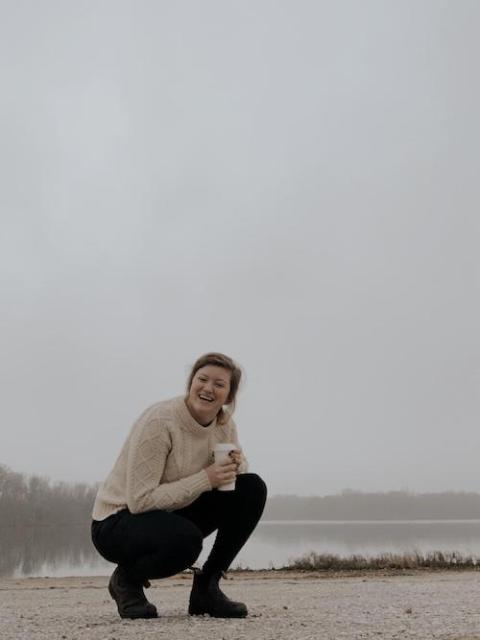
Shannon shares a laugh. (Maria Longo)
I regularly call my students and their families to offer what help I can and give them words of love and encouragement. I ask each of my students to pray with me over the phone, inviting their family members to join in. They tell me their fears and frustrations, commenting on how often they hear ambulance sirens or see trucks on television being loaded with bodies. There is little I can do all the way from Georgia now, but I can speak to them, pray with them, and search for them in the Eucharist. They can do something similar for each other and with their families.
We are small lights in the darkness, little pinpoint stars shining light-years away from each other. Still, we see each other, and we know each other despite the physical separation. I know that when we are reunited, we will do so with great joy. What we need most right now is to be fully vulnerable with the Lord and trust in him.
[Maria Longo serves with the Notre Dame AmeriCorps program in the Bronx, New York. Because of COVID-19, she is currently working from her family home in Powder Springs, Georgia.]






